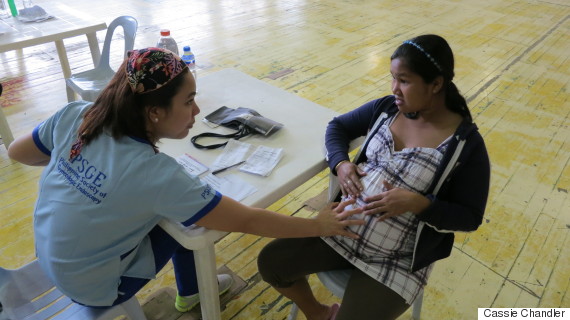
A young woman talks to an OBGYN at a Community Health Fair organized by CARD in January (Daet, Philippines).
When selecting a health care provider in the United States, we generally make decisions based on the quality of the practitioners and the costs of services and medications. We also look for offices that are close to our home or office. However imperfect our health system may be, we generally have the information and tools at our disposal to identify and select the best options for our individual needs.
In the developing world, however, making these same informed decisions is actually an acutely-felt barrier, one that often prevents women and their families from enjoying good health. When health care is needed but is delayed or not obtained, people's health worsens, which in turn leads to lost income and higher health care costs, both of which contribute to poverty.[1][2]
I'm lucky. I do not have to visit my health provider too often, perhaps once or so per year for a preventive check-up (or to pick up malaria prophylaxis before traveling to an endemic area). In between visits, my health provider network keeps in touch with me -- sending out articles, wellness updates, webinars, classes and healthy recipes. I can access my personal health history online to review lab test results, ask a question or make an appointment. All of this allows me to get to know and build trust with my health provider. It also develops confidence that I can manage my own health.
Whether in Asia, Latin America or Africa, one of the most significant barriers to good health is being able to access health services in a timely manner. There are a variety of obstacles that contribute to this.
For many the obstacle can be a lack of resources to pay for care, but geography and human behavior also play critical roles. When asked, women often talk about their lack of confidence when interacting with health providers. As a result, they avoid seeking care altogether for fear of feeling uncomfortable or receiving bad news.
However, solutions exist and are even more powerful when integrated with one another:
- Health messaging to improve knowledge: According to the World Health Organization, 99 percent of maternal deaths occur in developing countries. The Philippines, for example, is unlikely to achieve Millennium Development Goal 5 due to a surprisingly stagnant maternal mortality rate.
Freedom from Hunger and the Microcredit Summit Campaign are partnering with CARD, a Philippine microfinance institution (MFI) with health expertise and a platform that reaches more than 2.3 million microfinance clients. By the end of 2015, we will roll out a dialog-based maternal health education module to at least 600,000 women, along with enhanced access to OB/GYN care.
Preventive and diagnostic services are vitally important, so Freedom from Hunger is working with FINCA Peru to establish and enhance alliances with public health providers. Together, we are helping facilitate access to specific reproductive health and diagnostic services through community health fairs and breaking down barriers between FINCA Peru's members and local health providers in rural areas.
In Benin, Freedom from Hunger is working with local NGOs APHEDD and FADEC to reach very poor women and their families. In addition to addressing the knowledge and access barriers, we have developed an oral methodology for non-literate populations that allows women to put aside money for health savings. They can use these savings to pay for routine health services and make internal group loans to help members pay for more expensive (generally over $8) treatments.
Overcoming the "health access" hurdle requires holistic, multidisciplinary solutions as well as a collective commitment. Actors from different sectors including local NGOs, MFIs and health providers are challenged to work collaboratively to leverage their greatest strengths. Partners, such as Johnson & Johnson, the Bill & Melinda Gates Foundation and Oikocredit have led the way, supporting cost-effective, sustainable and integrated solutions to break down these barriers to access.
In the countries where we work, it is unlikely that we will soon see patients submitting questions to their doctors via the internet or receiving email blasts with healthy living tips. However, we can bridge the gap with collaboration and relationship building among a variety of sectors. This is a positive first step to clearing the "health access" hurdle.
[2] SMITH, J. 1999. Healthy bodies and thick wallets: the dual relation between health and socioeconomic status. J. Econ. Pers. 13: 145-166
[3] Noponen H, Pradan PK. 2004. Crises, setbacks and chronic problems -the determinants of economic stress events among poor households in India. Journal of International Development 1: 539-45.
Editor's Note: Johnson & Johnson is a sponsor of The Huffington Post's Global Motherhood section.